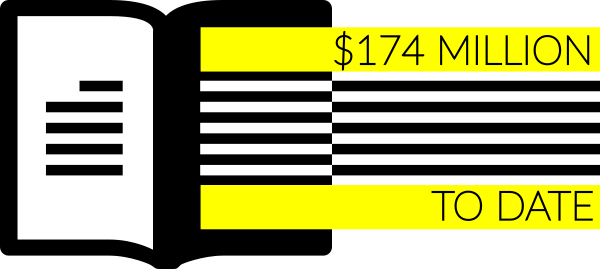Where are we?
mardi 12 janvier 2016 à 18:00Over the next few days, I’m going to share a series of posts about Creative Commons’ 2016-2020 strategy. Let me skip to the end: CC is going to refocus our work to build a vibrant, usable commons, powered by collaboration and gratitude. Over the course of these next few posts, I’ll explain what that means, and how we plan to achieve it.
The Creative Commons 2016-2020 Organizational Strategy reflects over a year of intensive consultation, discussion, brainstorming, analysis, and testing throughout CC’s global community, including staff, board, affiliates, partners, supporters, and donors. The insights and approaches contained within it have been influenced by hundreds of valuable discussions with creators, non-profits, foundations, government officials, advocacy organizations, content platforms, lawyers, librarians, museums, archivists, industry advocates, and open community leaders.
These essential discussions have taken place on mailing lists, in chat rooms, in boardrooms and coffee shops, in large groups and in one-on-one discussions. Prompted and unprompted, time and time again, the need for a more vibrant, usable, collaborative commons has been an issue of concern. This is a critical moment for the commons, for the open Web, and for Creative Commons. I am incredibly enthusiastic about this new direction for the organization, and we are all deeply motivated to bring it to life. I’m grateful to everyone who has given their time and energy to help shape this strategy.
We need to talk about sharing
Collaboration, sharing, and co-operation are in our nature — building community, co-operating towards common goods, and creating shared benefits are at the heart of who we are. In fact, these values live even closer to us than our beating hearts, operating at the level of our DNA. Martin Nowak, a Harvard professor who studies the underpinnings of evolution, argued in Scientific American that humanity’s story is one of both competition and cooperation. According to Nowak, it is not just a struggle for survival, but also an essential “snuggle for survival.”
An extreme take on Darwin’s theory of evolution might suggest we should never help our fellow humans. We are expected to exploit our creative works to the greatest extent possible, to extract the maximum benefit, to the exclusion of all others. To accept anything less is foolish. And yet the leading thinkers, and the data, suggest the exact opposite.
Nowak’s research shows that co-operators — even those who share at their own expense — often win out over time. Elinor Ostrom’s research on the power of shared economies and the collaborative management of common resources won her the Nobel Prize in Economics. In Adam Grant’s book, “Give and Take”, he goes beyond the idea that givers are purely altruistic, and argues that those who “give first are often best positioned for success later.” And giving doesn’t just help the giver, it also begets more giving. According to Grant, when researchers studied giving across social networks, they found that when one person gave at their own personal cost over a series of rounds, others were more likely to contribute in subsequent rounds, even with people who were not in the original group. “The presence of a single giver was enough to establish a norm of giving,” wrote Grant.
Sharing is not a purely selfless act — while thinking beyond one’s own personal benefit is at the core of why we share, it also pays itself forward in reputation, and rewards us with good feelings and personal gratification. Sharing contributes to our individual identity — how we want to see ourselves, and be seen, in the world. Nowak calls this kind of earned reputation “indirect reciprocity” — common in large, complex communities, where direct reciprocity is nearly impossible. Complex communities like the ones we created together with the Web. Individuals who share in these communities establish and accumulate reputation. To be known, and to be valued — that’s reputation — and it is essential to vibrant, open communities, from Wikipedia, to open science, to open source software. We accumulate benefits from others who give freely because of the norms created in those groups. These acts are not entirely altruistic, and the motivations behind them are real and powerful.
This is the real power of sharing: concurrent and lasting benefits, multiplied for the giver, the receiver, and society. If Grant’s research is right, then a global movement built around sharing and collaboration will be infectious — converting not only those who give and receive, but establishing and reinforcing new norms in online communities. Every share can inspire others — eventually, over the long run — to “share alike”.
The Internet is real life
The line between these online communities and real life is blurring, or in many cases, altogether irrelevant. The Internet is real life. It’s where we go to work. It’s how we connect to the people we love. It’s where we tell our stories. This is the society we’re building together. If it is going to be fair, equal, diverse, vibrant, serendipitous, and safe for everyone, it will only be because we choose to make it that way. If it is going to be accessible, equitable, and full of innovation and opportunity, it will require our leadership to build the foundations that support these ideals.
This is how Creative Commons can be successful: by ensuring that the legal, technical, and policy infrastructure we create is designed to foster cooperation and sharing. The tools and services we create are important, but equally or perhaps even more important is how we create them: by supporting and fostering open, collaborative communities and driving engagement across the spectrum of open knowledge and free culture. Our open values are at the heart of what we do, but also how we do it. If we are successful in this endeavour, we will be much closer to realizing our vision: unlocking the full potential of the Internet to drive a new era of development, growth, and productivity.
Next: Towards a vibrant, usable commons.
The post Where are we? appeared first on Creative Commons Blog.



